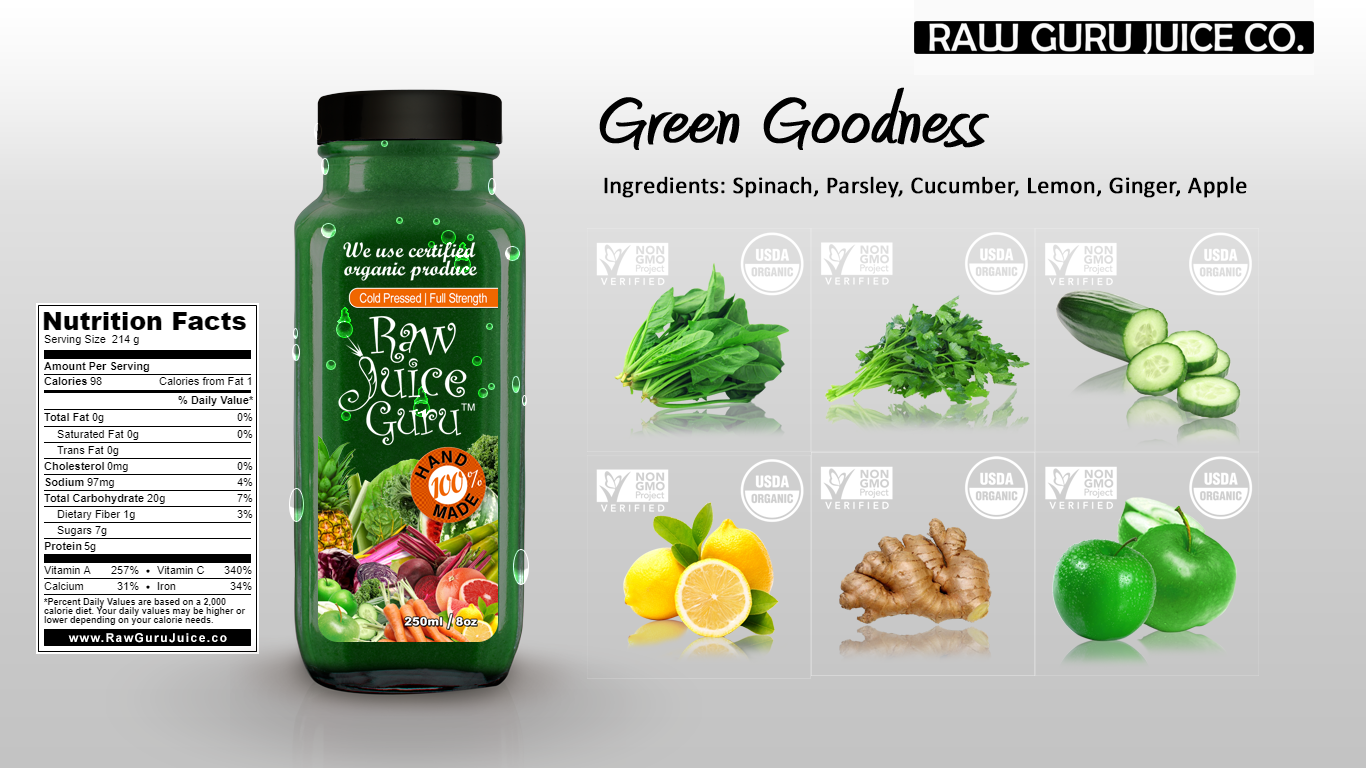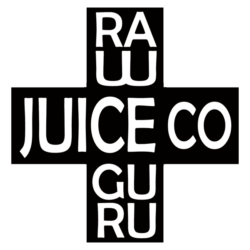A | B | C | D | E | F | G | H | I | J | K | L | M | N | O | P | Q | R | S | T | U | V | W | X | Y | Z
“The natural healing force within each one of us is the greatest force in getting well.” – Dr. Brian Clement
We have over 900 plus Raw Juices that we choose from to tailor your juice feasting cleanse experience with us. And since we cant list out every single juice we do. We would like to share with you the ingredients we do use and the amazing benefits to you and to your body. Both fruits and vegetables are vital in our lives and are packed with so much live enzymes, nutrients and vitamins.
A
Activated charcoal: View products with Activated Charcoal
Activated charcoal is a fine black powder made from bone char, coconut shells, peat, petroleum coke, coal, olive pits or sawdust. It becomes “activated charcoal” when high temperatures combine with a gas or activating agent to expand its surface area.
It has a variety of proposed benefits, ranging from lowering cholesterol to whitening teeth and curing hangovers.
Activated charcoal works by trapping toxins and chemicals in the gut, preventing their absorption. The charcoal’s porous texture has a negative electrical charge, which causes it to attract positively charged molecules, such as toxins and gases. This helps it trap toxins and chemicals in the gut. Because activated charcoal is not absorbed by your body, it can carry the toxins bound to its surface out of your body in feces.
Activated charcoal can bind a variety of drugs and toxins, preventing their absorption into the body. It’s often used as an anti-poison treatment or to treat drug overdoses.
Activated charcoal may also help reduce cholesterol levels. That’s because it can bind cholesterol and cholesterol-containing bile acids in the gut, preventing the body from absorbing them.
Some studies report that activated charcoal may help reduce gas production following a gas-producing meal. It may also help improve the odor of gas.
Tooth whitening: Using activated charcoal to brush your teeth is said to whiten them. it does this by absorbing plaque and other teeth-staining compounds.
Hangover prevention: Activated charcoal is sometimes used as a hangover cure. While consuming it with alcohol may reduce blood alcohol levels.
ONE IMPORTANT NOTE TO TAKE INTO FACTOR HERE: charcoal will also bind to nutrients and minerals, so if you take it with a meal it will get rid of those nutrients , so just keep that in mind. I know many put it with their raw juices, which defeats the point because it will flush out all those nutrients, so you are throwing your money away. You dont need to have it with anything else but water. There is no taste to it at all.
We wrote an article about this which will explain all this.
Aloe Vera: View products with Aloe Vera
 There are numerous benefits to gain from drinking the juice from the aloe vera plant. Hydration, clear skin, digestion, alkalinity, constipation relief and liver detox. It is also good for overal organ health. Beyond that it is a good source of nutrients like important vitamins and minerals like vitamins B, C, E, and folic acid. The gel of the aloe vera plant is made up of around 96% water, some organic and inorganic compounds, a type of protein which contains 18 of the 20 amino acids found in the body.
There are numerous benefits to gain from drinking the juice from the aloe vera plant. Hydration, clear skin, digestion, alkalinity, constipation relief and liver detox. It is also good for overal organ health. Beyond that it is a good source of nutrients like important vitamins and minerals like vitamins B, C, E, and folic acid. The gel of the aloe vera plant is made up of around 96% water, some organic and inorganic compounds, a type of protein which contains 18 of the 20 amino acids found in the body.
One of the most crucial elements found in aloe vera gel is a complex carbohydrate known as acemannan. It allows nutrients to reach the cells, nourish them and at the same time relieve them of toxins.Ayurveda, Chinese herbal medicine and British herbal medicine have all advocated aloe vera as a healer, when applied or consumed orally.
Aloe vera can improve the effectiveness of your diet and maximise your weight-loss potential. With ample amounts of vitamins and minerals that contribute to weight-loss, as well as amino acids, enzymes and sterols, aloe vera ensures your diet is not only supportive of weight-loss, but also improves the body’s absorption and utilisation, improving overall health as well as weight-loss success.
Aloe vera contains something called proteolytic enzymes which repairs dead skin cells on the scalp. It also acts as a great conditioner and leaves your hair all smooth and shiny. It promotes hair growth, prevents itching on the scalp, reduces dandruff and conditions your hair. Diane Gage, author of Aloe Vera: Nature’s Soothing Healer says, “Keratin, the primary protein of hair, consists of amino acids, oxygen, carbon, and small amounts of hydrogen, nitrogen, and sulphur. Aloe vera has a chemical make up similar to that of keratin and it rejuvenates the hair with its own nutrients, giving it more elasticity and preventing breakage.”
Apples: View products with Apple
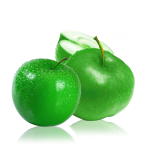 Apples are a good source of pectin, a soluble fiber. It aids in appetite control and improves digestion. Pectin reduces cholesterol and helps maintain steady blood sugar levels.
Apples are a good source of pectin, a soluble fiber. It aids in appetite control and improves digestion. Pectin reduces cholesterol and helps maintain steady blood sugar levels.
Apples are rich in vitamins A, B1, B2, B6, biotin, folic acid and pantothenic acid. They have a very high mineral content, which is beneficial for the health of your skin, hair and fingernails. 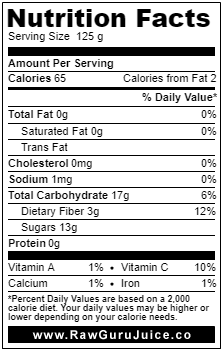 Apple skin is a source of quercetin, an antioxidant that keeps the heart and lungs healthy. Apples also contain a huge number of protective compounds – flavonoids, which are absorbed by the body and help make lung tissue healthier and more resistant to disease. So the old saying ‘an apple a day keeps the doctor away’ still holds true to this day. It helps reduce the risk of lung cancer while helping to boost resistance to respiratory illnesses.
Apple skin is a source of quercetin, an antioxidant that keeps the heart and lungs healthy. Apples also contain a huge number of protective compounds – flavonoids, which are absorbed by the body and help make lung tissue healthier and more resistant to disease. So the old saying ‘an apple a day keeps the doctor away’ still holds true to this day. It helps reduce the risk of lung cancer while helping to boost resistance to respiratory illnesses.
BUY ORGANIC. WHY? Apples are at the top of the list of produce most contaminated with pesticides. 92% of apples contained two or more pesticides. Even more pesticides and fungicides are applied after the harvest so the fruit can have a longer shelf life. We only use granny smith apples in our juices as they are low on the glycemic index plus they taste way better!
Arugula: View products with Arugula
Arugula is a lesser known cruciferous vegetable that provides many of the same benefits as other vegetables of the same family, such as broccoli, kale, and Brussels sprouts. The health benefits of arugula include weight loss, a reduced risk of cancer, healthy bones, and an improved eyesight. It has antioxidant properties and is good for skin. It also helps in strengthening the brain, improving metabolic functions, mineral absorption, and boosting the immune system.
Arugula is a leafy green plant packed with vitamins, minerals, and antioxidants. It is a good dietary choice for a healthy body and keeping the mind clear and focused. It contains high levels of folic acid and antioxidants like vitamin C, vitamin K, and vitamin A, which makes it integral in the fight against free radicals. It is packed with carotenoids, as well as many other minerals like potassium, manganese, iron, and calcium. Arugula contributes to your daily need for calcium, providing 64 mg in two cups.
Arugula contains phytochemicals, which are beneficial in preventing cancer. It is also superior to some other leafy greens because unlike other varieties, arugula is low in oxalates, which are chemicals that actually inhibit the absorption of minerals into the body. All in all, arugula is a low-calorie, nutrient-rich food.
The presence of vitamin K in arugula gives an anti-inflammatory boost to your body. Vitamin K also spurs an osteotropic activity in cells, meaning that promotes bone formation. The gradual degradation of neural pathways, found in conditions like Alzheimer’s disease, can be slowed down by an increase in intake of vitamin K. As a good source of Vitamin K, the consumption of arugula has been cited as a preventative method of such diseases.
Arugula’s combinative effects of low oxalate levels (allowing more minerals into the system) and the presence of so many minerals in the plant itself make it a strong support system for healthy bones.
The body is stimulated to create white blood cells from the copper in arugula, and the plant has a number of other ways to improve the strength of your immune system.
Vitamin C is one of the best defenses for your body to seek out dangerous, inflammatory free radicals and eliminate them from your body before they can cause real damage. This well-known vitamin is found in large quantities in arugula and helps prevent cancer and maintain good health by giving an extra push to your immune system.
Another benefit of arugula is the presence of B-Complex vitamins that promote metabolism. Eight B vitamins participate and aid in all different cell activities, including energy production, fat synthesis, the production of red blood cells, and many other vital processes for cell and metabolic health. Arugula is a well-known source of carotenoids, which are naturally occurring pigments that have long been famous for improving a person’s ability to see properly. Arugula has a very low level of oxalates when compared to other popular leafy vegetables like spinach. Oxalates inhibit the absorption of minerals by the body’s systems, which is counterproductive to consuming minerals in the same bite. So the minerals, like copper and iron, which you get from the plant, are more easily absorbed by the body for efficient use.
B
Beets: View products with Beet
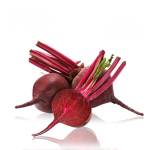 Beet greens contain an abundance of chlorophyll, vitamin A and C. It also has a high mineral content, being especially rich in calcium and potassium.
Beet greens contain an abundance of chlorophyll, vitamin A and C. It also has a high mineral content, being especially rich in calcium and potassium.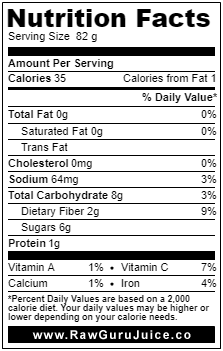 Beets contain fiber, vitamins C and K. Also rich in folate, which we all know as folic acid, a natural substance which aids in preventing certain birth defects and heart disease.
Beets contain fiber, vitamins C and K. Also rich in folate, which we all know as folic acid, a natural substance which aids in preventing certain birth defects and heart disease.
The betaine in beet juice stimulates the function of the liver cells and protects the liver and bile ducts. Beets are an excellent way to detoxify and renew the blood with minerals and natural sugars. It helps reconstitute the blood, bringing important sustenance to the brain, heart, lungs, liver and kidneys. For all the women out there, did you know that beet juice helps alleviate menstrual disturbances and menopausal symptoms? There is more. It’s a powerful kidney and blood cleanser. So stop worrying about its sugar content, it’s natural sugars.
Bentonite Clay: View products with Bentonite Clay
Bentonite clay is clay formed from the ash of volcanoes. The name “Bentonite” comes from the location of the largest source of the clay: Fort Benton, WY. Since the time of Aristotle, clays like bentonite have been used internally to soothe digestive ailments and topically to absorb toxins from the skin. SO how does bentonite clay work exactly? Believe it or not, it’s all about electricity. You see, your body is as much electric in nature as it is chemical. Your nervous system, brain, and circulatory system all operate on electrical impulses. This is what is measured when you have an EKG, for example. Bentonite clay produces an electrical charge when it contacts water. This negative charge attracts positively-charged toxins like toxic metals and chemicals. Like a magnetic sponge, it holds onto impurities and carries them out of the body for elimination.
Bentonite clay supports normal digestion, bacterial balance, the immune system, the liver, the body’s natural detoxification abilities, and more. Without a diet that’s rich in vegetables, fruits, and other whole foods, most of us don’t get enough alkalizing, mineral-rich foods in our diet. This matters because your body requires a complete collection of minerals to function. When those minerals aren’t present, it affects your health. Bentonite clay is naturally rich in minerals, and it can provide the minerals and trace minerals that you need for a healthy pH balance.
Due to its ability to keep toxins at bay in the digestive tract, bentonite helps support a diverse and robust gut microbiota. A healthy gut is essential not just for digestive health, but also a strong immune system. Studies published in such prestigious journals as The Journal of Antimicrobial Chemotherapy found that the minerals in bentonite clay, and other clays, have an impressive action against antibiotic-resistant bacteria.
Due to its magnetic properties, bentonite clay has shown promise in attracting and removing health-damaging environmental toxins like VOCs, which are a broad collection of toxic chemicals commonly found in paints, cleaning supplies, office equipment, permanent markers, and hundreds of other household products.
The key is to choose the right form of bentonite clay. Bentonite clay is available in food grade and non-food-grade form. Sodium Bentonite is the form of bentonite clay that’s suitable for human consumption, and Calcium Bentonite is typically used for topical application (for face creams, masks for face and hair).
Bittermelon: View products with Bittermelon
Bitter Melon or Bitter Gourd health benefits includes managing blood sugar and treating diabetes, enhancing body immunity, hemorrhoid relief, help sharpen vision, relieving asthma, enhance skin and treat skin conditions, plays role in cancer prevention and helps treat HIV and herpes. Other benefits includes reducing cholesterol levels, promoting bone health and promoting weight loss and good digestion.
Adding bitter melon fruit or juice to your diet helps you recover from common illnesses much quicker and decreases your susceptibility to infections. Bitter melon is abundant in antioxidants that constitute an impregnable line of defense against viruses. The fruit is rich in Vitamin C, a powerful antioxidant. A hundred-gram serving of bitter melon provides over 80 mg of vitamin C.
Bitter melon notably contains eye-health improving flavonoids such as ?-carotene, ?-carotene, lutein, and zeaxanthin. Together, these compounds enhance eyesight and night vision as well as decelerate macular degeneration. These compounds play a crucial role in fighting the effects of aging, eliminating oxygen-derived free radicals and reactive oxygen species that may lead to numerous complications.
Bitter melon has anti-histaminic, anti-inflammatory, and anti-viral properties, which makes it an ideal supplementary food in maintaining good respiratory health. It also helps promote sound sleep. The antifungal and antibacterial compounds present in the bitter melon fight off numerous skin infections including ringworm, scabies, and even the auto-immune condition psoriasis. t is also rich in Vitamin K, an essential nutrient that plays a key role in regulating normal blood clotting. Vitamin K also assists in calcium distribution throughout the body; thus, increasing bone density and reduces your risk of experiencing a bone fracture.
Blackberry: View products with Blackberry
This berry contains at least a third of the daily recommended value for four important nutrients and has been found to fight everything from premature skin aging to aggressive cancers. blackberries rank as one of the top 10 highest-antioxidant foods, according to its ORAC value. With an ORAC score of 5,905, these tiny fruits deliver a powerful punch of antioxidants with each bite, helping you fight disease, boost immunity and maintain premium health.
Blackberries contain polyphenols, a class of antioxidants known for their cancer-fighting abilities. Specifically, anthocyanin (a particular polyphenol) is found in high concentrations in this fruit. Anthocyanins are thought of as the primary weapon blackberries use against the development of cancer. One serving of blackberries has over a third of the daily recommended value of vitamin K, which plays a part in helping prevent and fight prostate, colon, stomach, nasal, oral and liver cancers. The presence of vitamin K helps regulate hormone function and thereby potentially reduces cramping pains. As a blood-clotting vitamin, it can also help with excessive bleeding and give some pain relief during heavy menstrual cycles.
The vitamin K in blackberries is important for the health of your entire cardiovascular system. Healthy consumption of vitamin K is also linked to healthy blood pressure levels, reduced inflammation in cells, as well as a lower chance of heart attack.
Just one cup of raw blackberries has 30.2 milligrams of vitamin C. That’s half the daily recommended value. Vitamin C is integral to collagen formation in bones, connective tissue, and blood vessels. For such a tiny berry, blackberries are high in fiber. One cup of raw blackberries has almost 8 grams.
Blackberries also show antibacterial activity, another function by which they protect your body from disease. They can reduce the impact of oral infections by targeting infected cells while leaving other cells untouched, making them a potentially powerful agent to treat infection. Blackberries naturally cause a reduction in inflammation and allow your body’s processes to happen as they should, rather than on overdrive.
Blueberry: View products with Blueberry
Blueberries are among the most nutrient dense berries. They are also about 85% water, and an entire cup contains only 84 calories, with 15 grams of carbohydrates. They are high in fiber, manganese, vitamin C and vitamin K. Blueberries have the highest antioxidant capacity of all commonly consumed fruits and vegetables. Flavonoids appear to be the major antioxidant compounds. Several studies have shown that blueberries and blueberry juice can protect against DNA damage, a leading driver of aging and cancer. ping to improve brain function and delaying age-related decline. The antioxidants in blueberries have been shown to protect LDL lipoproteins (the “bad” cholesterol) from oxidative damage, a crucial step in the pathway towards heart disease. The antioxidants in blueberries seem to have benefits for the brain, helping to improve brain function and delaying age-related decline.
Like cranberries, blueberries contain substances that can prevent certain bacteria from binding to the wall of the urinary bladder. This may be useful in preventing urinary tract infections.
Strenuous exercise can lead to muscle soreness and fatigue. This is driven, in part, by local inflammation and oxidative stress in the muscle tissue . Blueberry reduce the damage that occurs at the molecular level, minimizing soreness and reduction in muscle performance.
Bok Choy: View products with Bok Choy
Bok Choy contains a wealth of vitamins C, A, and K, and excellent sources of calcium, magnesium, potassium, manganese, and iron. Bok choy deserves its reputation as a powerhouse among vegetables. Vitamin A, for instance, is essential for a properly functioning immune system, while vitamin C is an antioxidant that shields the body from free radicals. Bok choy supplies potassium for healthy muscle and nerve function, and vitamin B6 for carbohydrate, fat, and protein metabolism.
The list of attributes for this one vegetable is virtually endless. That’s why it’s one of Dr. Mercola’s most highly recommended vegetables. Because of its strong beta-carotene content, bok choy ranks as our 11th richest food in vitamin A. This vitamin A richness places bok choy ahead of some of its fellow cruciferous vegetables, including cauliflower, cabbage, Brussels sprouts, and broccoli. Beta carotene levels in bok choy are high enough for the veggie to be highly recommended by the Macular Degeneration Association. In fact, a single cup of bok choy contains the entire RDA of beta carotene, which has been shown to prevent night blindness and possibly reduce the risk of cataract and macular degeneration.
The Harvard School of Public Health released the findings of an interesting study, asserting that high dairy intake can increase the risk of prostate cancer and possibly ovarian cancer. The study suggested that better forms of calcium should come from collards and bok choy.
Another study by the Vanderbilt-Ingram Cancer Center and the Shanghai Center for Disease Control and Prevention showed that eating dark, leafy green vegetables such as bok choy may improve breast cancer survival. A study of nearly 5,000 Chinese breast cancer survivors revealed a 27 to 62 percent decrease in the risk of dying from the disease when they consumed more cruciferous vegetables. Further, the chance of breast cancer recurrence in those participating in the program dropped by 21 to 35 percent. Phenols and other phytonutrients in bok choy represent what is now known to be a full spectrum of over 70 antioxidants in this cruciferous vegetable. The antioxidant richness of bok choy partly explains ongoing investigation of bok choy in relationship to cancer prevention since prevention and reduction of oxidative stress has often been linked to decreased cancer risk. Bok choy also contains glucosinolates, sulfur-containing compounds associated with reduced cancer risk.
Broccoli: View products with Broccoli
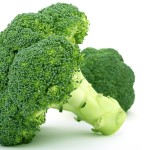
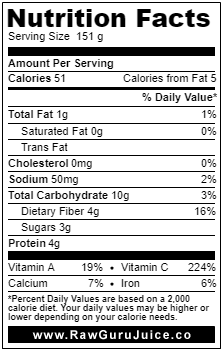 Broccoli is a potent anti-oxidant which has been proven to protect against cancer. It is loaded with Vitamin C, more so than oranges, that we should all be consuming as much as possible – especially to prevent cancer. A chemical called Sulforaphane is in broccoli, it has been shown to kill peptic ulcers and gastritis.
Broccoli is a potent anti-oxidant which has been proven to protect against cancer. It is loaded with Vitamin C, more so than oranges, that we should all be consuming as much as possible – especially to prevent cancer. A chemical called Sulforaphane is in broccoli, it has been shown to kill peptic ulcers and gastritis.
A scientific fact for you to ponder on as you drink one of our broccoli raw juice combinations: Broccoli resonates energetically at 300MHz!! Compare this to our bodies that start to become diseased if its cells are resonating below 50MHz and a cancer cell resonates between 0 and 30MHz.
C
Cabbage: View products with Cabbage
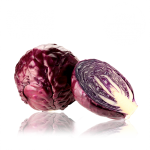 Red or Green, cabbage is a cruciferous vegetable along with cauliflower, kale, cress, bok choy, broccoli and a few other green leaf vegetables. Cruciferous vegetables have long been praised for being healthy and important additions to one’s diet. Sources recommend a minimum of 3-4 servings of cruciferous vegetables a week. These veggies are “Super-Veggies” because of all of the nutrient goodness locked inside:
Red or Green, cabbage is a cruciferous vegetable along with cauliflower, kale, cress, bok choy, broccoli and a few other green leaf vegetables. Cruciferous vegetables have long been praised for being healthy and important additions to one’s diet. Sources recommend a minimum of 3-4 servings of cruciferous vegetables a week. These veggies are “Super-Veggies” because of all of the nutrient goodness locked inside: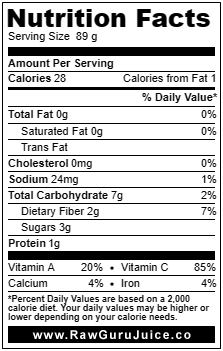 They all contain phytochemicals, vitamins and minerals, and fiber that are important to your health (although some have more than others)…One of the big reasons to eat plenty of cruciferous vegetables is that they may help to lower your risk of getting cancer.
They all contain phytochemicals, vitamins and minerals, and fiber that are important to your health (although some have more than others)…One of the big reasons to eat plenty of cruciferous vegetables is that they may help to lower your risk of getting cancer.
Red Cabbage known as purple cabbage, is darker in color than it’s green counterpart, because it has a higher “concentration of anthocyanin polyphenols, which contribute to red cabbage containing significantly more protective phytonutrients than green cabbage.” Anthocyanin Polyphenols are pigment compounds found in many plants that lend them their characteristic colors and have antioxidant, anti-inflammatory, and potentially protective properties.
Cantaloupe: View products with Cantaloupe
Cantaloupe is a delicious fruit having a variety of health benefits, including healthy skin and eyes, reduced chances of cancer, healthy lungs, and decreased stress levels. It also strengthens the immune system, prevents arthritis, and aids in managing diabetes. These attributes are mainly due to the high levels of vitamins and minerals that are present in this popular melon. Cantaloupe is rich in many nutrients that provide various health benefits. It contains carbohydrates, protein, and water. Vitamins in a cantaloupe include vitamin A, beta-carotene, vitamin B1, vitamin B2, vitamin B6, vitamin B9, vitamin C, and vitamin K. The mineral wealth of this fruit includes potassium, calcium, iron, magnesium, phosphorus, and zinc.
The antioxidant zeaxanthin, found in cantaloupe, filters out harmful blue light rays and is thought to play a protective role in eye health and possibly ward off damage from macular degeneration.
One cup of diced cantaloupe contains only 53 calories. Just 200 grams of cantaloupe exceeds your daily vitamin C requirements. The fiber, potassium, vitamin C, and choline content in cantaloupe all support heart health. Cantaloupe, because it is high in both fiber and moisture, helps to prevent constipation, promote regularity, and maintain a healthy digestive tract.
With its high water and electrolyte content, cantaloupe is a great snack to have on hand during the hot summer months to prevent dehydration. It is also a great go-to snack after a workout for same reason.
Choline an essential and versatile nutrient is present in cantaloupe. Choline aids the body in sleep, muscle movement, learning, and memory. While it also helps to maintain the structure of cellular membranes, aids in the transmission of nerve impulses, assists in the absorption of fat, and reduces chronic inflammation.
Cantaloupe is beneficial for hair and skin because it has vitamin A, a nutrient required for sebum production, which is a compound that keeps hair moisturized and healthy. It is also necessary for the growth of all bodily tissues, including skin and hair.
Cantaloupe contains an abundance of antioxidants including choline, zeaxanthin, and beta-carotene, all of which protect against a range of diseases and conditions from the common cold to cancer.
Carrots: View products with Carrot
 The three most important elements of carrots are beta-corotene, vitamin A and phytochemicals. There is powerful health benefits including beautiful skin, cancer prevention, and anti-aging. With that said they also improve muscle, soft tissue and skin health. While reducing the risk of heart disease and high blood pressure, while boosting immunity and protecting the skin against sun damage.
The three most important elements of carrots are beta-corotene, vitamin A and phytochemicals. There is powerful health benefits including beautiful skin, cancer prevention, and anti-aging. With that said they also improve muscle, soft tissue and skin health. While reducing the risk of heart disease and high blood pressure, while boosting immunity and protecting the skin against sun damage.
Studies have shown carrots reduce the risk of lung cancer, breast cancer and colon cancer. because of falcarinol and falcarindiol which they feel cause the anticancer properties. The high levels beta-carotene also act as an antioxidant to cell damage done to the body through regular metabolism. It helps slow down the aging of cells. Beta Carotene is also converted into vitamin A in the liver, which helps our retina. Carrots are good for the eyes. Vitamin A and antioxidants protects the skin from sun damage. Deficiencies of vitamin A cause dryness to the skin, hair and nails. This vitamin helps prevent premature wrinkling, acne, dry skin, pigmentation, blemishes, uneven skin tone. Vitamin A assists the liver in flushing out the toxins from the body.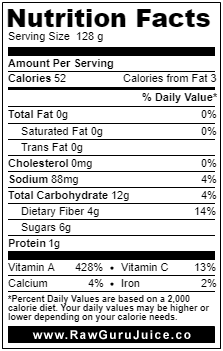 It reduces the bile and fat in the liver. The fiber in carrot juice helps clean out the colon and waste movement. Carrots have not only beta-carotene but also alpha-carotene and lutein. The regular consumption of carrots also reduces cholesterol levels because the soluble fibers in carrots binding with bile acids.
It reduces the bile and fat in the liver. The fiber in carrot juice helps clean out the colon and waste movement. Carrots have not only beta-carotene but also alpha-carotene and lutein. The regular consumption of carrots also reduces cholesterol levels because the soluble fibers in carrots binding with bile acids.
BUY ORGANIC. WHY? Carrots soak up agricultural chemicals lurking in the soil. Conventional growers fumigate soil to kill pests such as carrot-fly larvae and nematodes, which nibble farm produce when they’ve run out of other organic matter to eat. Further, seeds are pretreated with fungicide before they’re planted. And just before the carrots emerge, they’re sprayed with a weedkiller. Not sure about you but that is a lot of chemicals for one vegetable’s life cycle.
Cayenne Pepper: View products with Cayenne Pepper
A single teaspoon of cayenne pepper imparts 15 percent of the daily recommended value in vitamin A (good for fighting infection, as well as to maintain healthy mucous membranes, from your lungs to your urinary tract), and 3 percent of the vitamin E (aka alpha tocopherol). And tend to have a high carotenoid content – especially lycopene and astaxanthin. Cayenne peppers are an excellent source of vitamin C, which provides collagen synthesis to retain healthy skin, blood vessels, bones and organs, and helps boost your immunity. Vitamin K maintains healthy blood flow. Cayenne is also a good source of vitamin B6, manganese, niacin, riboflavin, magnesium and iron, as well as potassium, which helps control your heart rate and blood pressure.
Capsaicin a component in cayenne pepper helps every other herb function better because it stimulates the circulation of blood, which helps get the beneficial bio-chemicals and nutrition to the cells. Cayenne is an extremely effective treatment for heart and blood circulation problems, palpitations and cardiac arrhythmia (irregular heart beat). It’s a miracle for congestive heart failure and is beneficial for someone who has any type of circulatory problems, such as high or low blood pressure, elevated cholesterol, high triglycerides, and even varicose veins. An impressive number of other health benefits can be gleaned by ingesting careful amounts of cayenne pepper, especially in regard to capsaicin for pain relief.
Cayenne pepper is also great for: Clearing congestion – It may come as no surprise that the heat from cayenne peppers can help loosen up phlegm and mucus in your lungs and nasal passages so you can get rid of it. Amazing at Reducing headache pain – The capsaicin in cayenne peppers is thought to bring about headache relief by depleting Substance P, a neurotransmitter that helps send pain signals. It also helps fights inflammation again because of Capsaicin. It also helos Lowers Type 2 diabetes risk – Ingesting chili peppers has been found to lower the amount of insulin needed to lower your blood sugar after a meal. Further, the more often hot pepper is included in your meals, the less insulin is required. And lastly it Aids in weight loss – Science shows that cayenne pepper contains heat-producing compounds that create a phenomenon known as thermogenesis, which consumes oxygen in your body and can result in weight loss.
Celery: View products with Celery
 Celery leaves have a high content of vitamin A. while the stems are an excellent source of vitamins B1, B2, B6 and C with rich supplies of potassium, folic acid, calcium, magnesium, iron, phosphorus, sodium and plenty essential amino acids. Including just 4 stalks of celery in your morning raw juice can lower high blood pressure by 12 to 14%. The Chinese have been using celery for centuries to reduce blood pressure and now you know why.
Celery leaves have a high content of vitamin A. while the stems are an excellent source of vitamins B1, B2, B6 and C with rich supplies of potassium, folic acid, calcium, magnesium, iron, phosphorus, sodium and plenty essential amino acids. Including just 4 stalks of celery in your morning raw juice can lower high blood pressure by 12 to 14%. The Chinese have been using celery for centuries to reduce blood pressure and now you know why.
Celery contains 8 families of anticancer compounds. One of the active compounds called Phthalides, which are known to relax the muscles of the arteries that regulate blood pressure, allowing them to dilate. It also helps reduce stress hormones. Celery also contains a compound called coumarins that helps prevent free radicals from damaging cells. Decreasing the mutations that increase the potential for cells to become cancerous. How you ask? It magnifies the activity of certain white blood cells, immune defenders that target and eliminate potentially harmful cells, including cancers cells. A third compound in celery known as acetylenics has been shown to stop the growth of tumor cells. Phenolic acids which block the action of prostaglandins that encourages the growth of tumor cells.
What Celery is most famously known for is its high content of organic sodium. The important minerals celery raw juice balances the body’s blood pH, neutralizing acidity. And celery juice acts as the perfect post-workout tonic as it replaces lost electrolytes and re-hydrates the body with its rich minerals. The natural organic sodium (salt) in celery is very safe for consumption, in fact it is essential for the body. People with high blood pressure can safely take the sodium in celery, unlike table salt (iodized sodium) which is harmful.
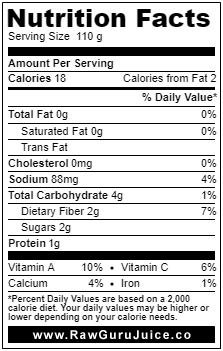 Nutrients in the fiber are released during juicing that helps aid bowel movements, it has a natural laxative in the juice that helps relieve constipation. It is also a diuretic cause of the potassium and sodium in the juice that regulates blood fluid and stimulates urine production, getting rid of the bodies excess fluid. Helping those who suffer from urinary and gall bladder stones. It promotes healthy and normal kidney function by aiding elimination of toxins from the body. While eliminating toxins, it also prevents formation of kidney stones.
Nutrients in the fiber are released during juicing that helps aid bowel movements, it has a natural laxative in the juice that helps relieve constipation. It is also a diuretic cause of the potassium and sodium in the juice that regulates blood fluid and stimulates urine production, getting rid of the bodies excess fluid. Helping those who suffer from urinary and gall bladder stones. It promotes healthy and normal kidney function by aiding elimination of toxins from the body. While eliminating toxins, it also prevents formation of kidney stones.
The polyacetylene in celery is an amazing relief for all inflammation like rheumatoid arthritis, osteoarthritis, gout, asthma and bronchitis. The Juice also helps lower cholesterol and LDL (bad) chlolesterol. Celery is a constant ingredient in a lot of our 800+ Raw juices and after reading the above it becomes clear why.
Chlorella: View products with Chlorella
Chlorella is a blue-green algae like its cousin spirulina. chlorella is one of the most nutrient-dense superfoods in the world. Its rich in phytonutrients, including amino acids, chlorophyll, beta-carotene, potassium, phosphorous, biotin, magnesium and the B-complex vitamins. It is more nutrient dense per gram than other greens, including kale, spinach and broccoli!
Chlorella benefits the entire body by supporting healthy hormonal function, promoting cardiovascular health, helping to negate the effects of chemotherapy and radiation, lowering blood pressure and cholesterol, aiding in the detoxification of our bodies, and chlorella activates a number of genes at the cellular level that improve insulin sensitivity, encouraging a healthy balance for diabetics with type 2.
Chlorella’s rich green color comes from a high concentration of chlorophyll. Chlorella’s high levels of chlorophyll have been shown to protect the body against ultraviolet radiation treatments and Chemo while removing radioactive particles from the body. But it does stop there First, when taken preemptively, it strengthens the immune system, so our bodies respond properly. Second, because it removes heavy metals and toxins from our body, we are less likely to get environmentally based cancers. Third, studies have shown that individuals once diagnosed with cancer, chlorella enhances the action of T cells helping to fight new abnormal cells. And again, if cancer is diagnosed, and chemotherapy or radiation therapy is used, chlorella can help to fight the side effects and be used in addition to natural cancer treatments.
One of chlorella’s most significant health benefits is that it wraps itself around even stubborn toxins residing in our bodies, such as lead, cadmium, mercury and uranium, and keeps them from being reabsorbed. Regular consumption of chlorella can even help keep heavy metals from accumulating in our bodies’ soft tissues and organs in the first place.
Chlorella benefits you by helping to regulate hormones, helping with metabolism, improving circulation, and promoting higher levels of energy. It also helps to reduce weight and body fat, and removes stored toxins. As our bodies lose weight, toxins are released, and can be reabsorbed. It is important to flush these toxins out of our system as quickly as possible. Chlorella’s ability to surround the toxins and heavy metals resident in our bodies helps facilitate elimination and prevent reabsorption.
All you ladies will love this one chlorella is effective at giving you younger looking skin. Because it naturally increases levels of vitamin A, vitamin C and glutathione in your body which eliminates free-radicals and protects your cells.
When purchasing a chlorella supplement make sure to buy “cracked cell wall chlorella” because they are completely absorbable.
Chlorophyll: View products with Chlorophyll
Chlorophyll is a type of plant pigment responsible for the absorption of light in the process of photosynthesis, which creates energy. So all green leafy vegetables and plants you see and eat have chlorophyll, including spirulina and chlorella.
Chlorophyll blocks carcinogenic effects within the body and protects DNA from damage caused by toxic molds. And that’s just one of the five major chlorophyll benefits for human health, all of which help cleanse the body and allow it to function at an optimal level.
Chlorophyll can bind to potential carcinogens and interfere with how they’re absorbed within the human gastrointestinal track. This helps stop them from being circulated throughout the body and reaching susceptible tissues, such as those within the joints or heart. Chlorophyll decreases the risk for cancer development and cleanses the liver by interfering with the metabolism of chemicals’ procarcinogen, which must first be metabolized in order to damage DNA. Within the human body, enzymes called cytochrome P450 activate procarcinogens and turn them into active carcinogens, which go on to attack healthy cells. This means inhibiting their effects can help stop the process of chemically induced cancers.
Chlorophyll promotes optimal liver health and therefore the body’s natural elimination of potentially harmful toxins by increasing phase II biotransformation enzymes. So it protects healthy cells and tissues. Another way that chlorophyll improves detoxification is by speeding up waste elimination, balancing fluid levels and reducing cases of constipation
On a molecular level, the structure of chlorophyll is very similar to hemoglobin present in human blood. Hemoglobin carries oxygen to the lungs and other respiratory surfaces to be released into tissues throughout the body. The primary reason chlorophyll is considered a superfood is because of its strong antioxidant and anticancer effects. Chlorophyll benefits the immune system because it’s able to form tight molecular bonds with certain chemicals that contribute to oxidative damage and diseases like cancer.
Cilantro: View products with Cilantro
Cilantro is loaded with beneficial phytochemicals, vitamins, minerals and antioxidants. Cilantro is very low in saturated fat and cholesterol, and the caloric value is nearly nonexistent. It is a good source of dietary fiber, vitamins A, C, E, K, calcium, iron, potassium, and magnesium. Just a ¼ cup of fresh cilantro provides 270 IU of Vitamin A, and 16% of the daily value recommended of vitamin K. The vitamin K and calcium content of cilantro help to build strong bones, teeth, and hair.
Arsenic, cadmium, aluminum, lead, and mercury can become resident in our tissues leading to heart disease, hormonal imbalances, neurological conditions, infertility, and so much more. Cilantro, also known scientifically as “Coriandrum sativum”, has been shown to bind these toxic metals together, loosening them from tissue, and facilitating their elimination from the body. Cilantro is considered a chelator, that is it can bind to heavy metals and allow your body to excrete them. This is big since most people are unknowingly exposed to heavy metals on a regular basis. Cilantro benefits not only detox the body but also protect it from infection and toxins. Its natural antibacterial properties helps to protect against both food and water borne diseases including food poisoning, dysentery, salmonella, cholera, and particularly listeria.
The phytochemicals in cilantro help protect your heart from oxidative damage helping to keep it healthy. Cilantro also shows the ability to help balance blood sugar levels, giving another good reason to add it to salads, juices and smoothies. Given how damaging elevated levels of glucose in the body can be, everyone can benefit from keeping blood sugar levels balanced. It can also help you maintain consistent energy levels throughout the day.
Diseases of the brain such as Alzheimer’s or Parkinson’s are thought to be associated with two things: chronic inflammation and oxidative damage, cilantro can protect your brain from both. Cilantro is a rich source of vitamin A for healthy eyes. Cilantro has been used for thousands of years to treat digestive upset, gas, fungal and bacterial infections, and to prevent food poisoning. Some studies show that it can help to lower blood sugar, and even kill parasites in the digestive tract.
Cilantro also benefits your sleep cycle naturally and calms nerves, and can improve sleep quality through its natural sedative effects. High levels of cilantro extract produce the same levels of anti anxiety effects as the popular prescription drug, Valium (diazepam).
Cinnamon: View products with Cinnamon
Cinnamon is a spice that is made from the inner bark of trees scientifically known as Cinnamomum. The distinct smell and flavor of cinnamon are due to the oily part, which is very high in the compound cinnamaldehyde. This compound is responsible for most of cinnamon’s powerful effects on health and metabolism. Cinnamon is loaded with powerful antioxidants, such as polyphenols. The antioxidants in cinnamon have anti-inflammatory effects, It helps your body fight infections and repair tissue damage.
Cinnamon has been linked to a reduced risk of heart disease, the world’s most common cause of premature death. In people with type 2 diabetes, 1 gram or about half a teaspoon of cinnamon per day has been shown to have beneficial effects on blood markers. Cinnamon can dramatically reduce insulin resistance, helping this important hormone do its job. By increasing insulin sensitivity, cinnamon can lower blood sugar level. cinnamon has been shown to decrease the amount of glucose that enters your bloodstream after a meal. It does this by interfering with numerous digestive enzymes, which slows the breakdown of carbohydrates in your digestive tract. Also, a compound in cinnamon can act on cells by mimicking insulin.
Cinnamon also reduces levels of total cholesterol, “bad” LDL cholesterol and triglycerides, while “good” HDL cholesterol remains stable. Cinnamaldehyde, one of the main active components of cinnamon, may help fight various kinds of infection. Cinnamon oil has been shown to effectively treat respiratory tract infections caused by fungi. It can also inhibit the growth of certain bacteria, including Listeria and Salmonella.
Coconut Water: View products with Coconut
 Did you know that in the Second World War, coconut water was used as a successful blood plasma substitute as it created an alkalising blood cleanse, due to its inability to produce heat and destroy red blood cells. A healthy balance of electrolytes in one’s system, as is ensured by coconut water, is a great aid to the overall health and well being of the cardiovascular, immune, nervous and muscular systems in the body. It is known for its low calorific value and highly refreshing properties the world over. Just 9 ounces of coconut water contain 9 grams of carbohydrates, 45 mg of phosphorous, 2 grams of protein, 60 mg of magnesium, 600 mg of potassium and 250 mg of sodium.
Did you know that in the Second World War, coconut water was used as a successful blood plasma substitute as it created an alkalising blood cleanse, due to its inability to produce heat and destroy red blood cells. A healthy balance of electrolytes in one’s system, as is ensured by coconut water, is a great aid to the overall health and well being of the cardiovascular, immune, nervous and muscular systems in the body. It is known for its low calorific value and highly refreshing properties the world over. Just 9 ounces of coconut water contain 9 grams of carbohydrates, 45 mg of phosphorous, 2 grams of protein, 60 mg of magnesium, 600 mg of potassium and 250 mg of sodium.
Benefits are endless: its an Electrolyte and Alkalizes the body, it Aids in Digestion, Lowers Blood sugar level, antibacterial and antifungal. Coconut water is amazing for diabetics, cause its low in sugar. 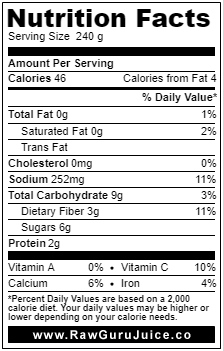 It is effective at treating include stomach flu, dysentery, indigestion, constipation, intestinal worms, cholera, urinary abnormalities, urethral stone, malfunctioning kidneys, dry and itchy skin, age spots, and wrinkles. The key nutrients in Coconut Water include lauric acid, cytokinins, Chloride, and Iron, as well as important electrolytes such as Potassium, Magnesium, Calcium, Sodium, and Phosphorous.
It is effective at treating include stomach flu, dysentery, indigestion, constipation, intestinal worms, cholera, urinary abnormalities, urethral stone, malfunctioning kidneys, dry and itchy skin, age spots, and wrinkles. The key nutrients in Coconut Water include lauric acid, cytokinins, Chloride, and Iron, as well as important electrolytes such as Potassium, Magnesium, Calcium, Sodium, and Phosphorous.
Cytokinins and lauric acid are known for minimizing ageing of skin tissue and strengthen connective tissue. Coconut water has been used to treat numerous conditions that affect the digestive tract such as dysentery, diarrhea, stomach flu and cholera. And as a bonus Applying coconut water/oil on the skin has been known to help cases of acne, cellulite, eczema, stretch marks and wrinkles.
Collard Greens: View products with Collard
Collard greens are among the best vitamin C foods, and they’re a good source of vitamin K and soluble fiber. They also contain multiple nutrients with potent anti-cancer properties, such as diindolylmethane and sulforaphane. Because collard greens reduce inflammation, they impact our cardiovascular health. Vitamin K, which is abundant in collard greens, is a critical nutrient for reducing inflammation and protecting cells that line blood vessels, including both veins and arteries.
Because collard greens are some of the best high-fiber foods, eating this beneficial vegetable stimulates the digestive system. IBS generally causes severe symptoms, such as diarrhea or ulceration of the digestive tract. One major cause of IBS is a low-fiber diet and nutritional deficiencies. Because of the high fiber content in collard greens, they treat this syndrome that’s often related to a number of other health conditions, including ulcerative colitis, Crohn’s disease and leaky gut syndrome.
Vitamin A is a fat-soluble vitamin that’s also a powerful antioxidant. With a cup of collard greens fulfilling 300 percent of your recommended daily value, you surely experience the amazing vitamin A benefits with this nutritious vegetable. Vitamin A plays a critical role in maintaining healthy vision, neurological function and healthy skin.
Cruciferous vegetables, like collard greens, are unique because they’re rich in sulfur-containing compounds called glucosinolates, which support detoxification, and indole-3-carbinol that greatly reduces the risk of breast, colon and lung cancer. Collard greens are a great source of vitamin K and vitamin A; they’re also rich is soluble fiber and have strong antioxidant properties. By adding collard greens to your diet, you reduce disease-causing inflammation, cure digestive conditions, detox your body and boost cardiovascular health.
One of the most important components of collard greens, and other cruciferous vegetables, is glutathione. This peptide consists of three key amino acids that play several vital roles in the body. It helps the liver cleanse and detoxify fat, boosts immune function, fights cancer, protects the body from environmental toxins, and prevents drug resistance. Glutathione is so important to our health that longevity researchers believe the levels that are present in our cells serve as a predictor of how long we are going to live. Collard greens boost glutathione levels and allow this molecule to do its magic.
Cranberry: View products with Cranberry
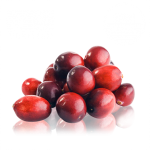 Cranberries have a high vitamin C content, a good portion of fiber and maybe has been mentioned as being an anti-oxidant.
Cranberries have a high vitamin C content, a good portion of fiber and maybe has been mentioned as being an anti-oxidant. 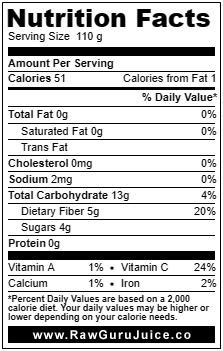 Raw Cranberry juice is also known to treat Urinary Tract Infection. its complete phytonutrient package is what makes cranberries such an impressive and important fruit. There is 5 key health-supportive phytonutrients in cranberries” in the chart below: Phenolic Acids, Proanthocyanidins, Anthocyanins, Flavonoids and Triterpenoids.
Raw Cranberry juice is also known to treat Urinary Tract Infection. its complete phytonutrient package is what makes cranberries such an impressive and important fruit. There is 5 key health-supportive phytonutrients in cranberries” in the chart below: Phenolic Acids, Proanthocyanidins, Anthocyanins, Flavonoids and Triterpenoids.
Having all these 5 pyhtonutrients combines in one little fruit, makes cranberries extremely powerful. All of phytonutrients in cranberries have been shown to help protect against heart disease, cancer, gum disease, stomach ulcers, urinary tract infections, liver, anti-inflammatory issues and other diseases.
Cucumber: View products with Cucumber
 Cucumber Juice is a good source of vitamin A, C, and K. Also a good source of phosphorus, pantothenic acid, manganese, magnesium and potassium.
Cucumber Juice is a good source of vitamin A, C, and K. Also a good source of phosphorus, pantothenic acid, manganese, magnesium and potassium.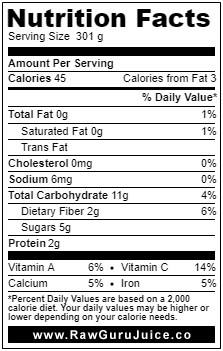 Cucumber contains two useful compounds called ascorbic acid and caffeic acid, both help prevent water retention and lowers cholesterol level.
Cucumber contains two useful compounds called ascorbic acid and caffeic acid, both help prevent water retention and lowers cholesterol level.
Cucumbers are an excellent source of silicon, that the body uses as one of the building blocks for connective tissue, which includes intracellular cement, tendons, cartilage, muscles, bone and ligaments. But is known as “the beauty mineral”, why? It has an ability to improve skin, nails and hair. Giving you youthful glow and complexion. Its source of silicon and high nutrient water content makes it naturally hydrating for the health of your skin. “It adds luster to the hair, sparkle to the eye, color to the lips, tone to the skin and spring to the step.” Paul Bragg
D
Dandelion: View products with Dandelion
 A powerful healer, used to purify the blood, help digestion and prevent gall stones. Provides 535% recommended daily value of vitamin K, the most important source to strengthen bones, and also fights Alzheimers by limiting neuron damage in the brain.
A powerful healer, used to purify the blood, help digestion and prevent gall stones. Provides 535% recommended daily value of vitamin K, the most important source to strengthen bones, and also fights Alzheimers by limiting neuron damage in the brain.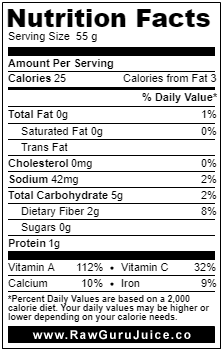
Dandelion greens also give the body 112% of the daily recommended value of vitamin A as an antioxidant carotenoid, which is particularly good for the skin, mucus membranes and vision. A flavonoid called zeaxanthin protects the retina from UV rays, while others, primarily carotene, lutein, and cryptoxanthin, protect the body from lung and mouth cancers. Dandelion greens are high in fiber helping your body expel toxins. These greens also contain vitamins C and B6, thiamin, riboflavin, calcium, iron – for generating red blood cells, potassium – to help regulate heart rate and blood pressure, and manganese. Dandelion also has high levels of folate, magnesium, phosphorus, and copper.
F
Fennel: View products with Fennel
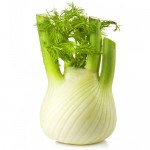 Fennel is an excellent source of vitamin C, potassium, phosphorus, copper, folic acid (folate), manganese, and fiber when eaten, and is also a good source of magnesium, iron, calcium, and niacin.
Fennel is an excellent source of vitamin C, potassium, phosphorus, copper, folic acid (folate), manganese, and fiber when eaten, and is also a good source of magnesium, iron, calcium, and niacin. 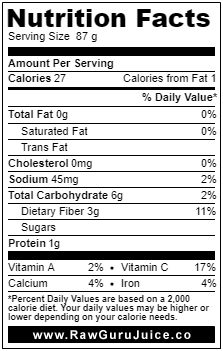 Fennel has a calming effect on digestion and is very good at reducing bloating. Fennel is used to treat digestive disorders, relieve intestinal cramps, relieving excess gas, and soothing stomach pain. Fennel contains phytoestrogens, that eases the symptoms of menopause. Fennel has a volatile oil called anethole, that is effective for anti-inflammatory and in cancer prevention. Fennel is also helpful to treat: asthma, anxiety, depression, high blood pressure, decreased libido, coughs, heartburn.
Fennel has a calming effect on digestion and is very good at reducing bloating. Fennel is used to treat digestive disorders, relieve intestinal cramps, relieving excess gas, and soothing stomach pain. Fennel contains phytoestrogens, that eases the symptoms of menopause. Fennel has a volatile oil called anethole, that is effective for anti-inflammatory and in cancer prevention. Fennel is also helpful to treat: asthma, anxiety, depression, high blood pressure, decreased libido, coughs, heartburn.
Fennel helps the body release endorphins, they are the feel good peptides from the brain into our blood. Helps diminish anxiety and fear and generates a mood of euphoria like.
Flaxseed: View products with Flaxseed
Omega-3 essential fatty acids, “good” fats that have been shown to have heart-healthy effects. Each tablespoon of ground flaxseed contains about 1.8 grams of plant omega-3s. Lignans, which have both plant estrogen and antioxidant qualities. Its a rich source of alpha-linolenic acid (ALA), a mostly plant-based omega-3 fatty acid (2).
ALA is one of the two essential fatty acids that you have to obtain from the food you eat, as your body doesn’t produce them. ALA fatty acids are proven to have heart health benefits and are linked to a lower risk of stroke. Flaxseed contains 75 to 800 times more lignans than other plant foods.
That plant omega-3s in Flaxseed help the cardiovascular system through several different mechanisms, including anti-inflammatory action and normalizing the heartbeat. There is also significant blood pressure-lowering effects of flaxseed. Those effects may be due to both the omega-3 fatty acids as well as the amino acid groups found in flaxseed. Diets rich in flaxseed omega-3s help prevent hardening of the arteries and keep plaque from being deposited in the arteries partly by keeping white blood cells from sticking to the blood vessels’ inner linings.
Just one tablespoon of flaxseeds contains 3 grams of fiber, which is 8–12% of the daily recommended intake. What’s more, flaxseeds contain two types of dietary fiber: soluble and insoluble. This fiber duo gets fermented by the bacteria in the large bowel, bulks up stools and results in more regular bowel movements. On one hand, soluble fiber increases the consistency of the contents of your intestine and slows down your digestion rate. This has been shown to help regulate blood sugar and lower cholesterol. On the other hand, insoluble fiber allows more water to bind to the stools, increases their bulk and results in softer stools. This is useful for preventing constipation and for those who have irritable bowel syndrome or diverticular disease.
Flaxseeds are a great source of plant-based protein, and there’s growing interest in flaxseed protein and its health benefits. Flaxseed protein is rich in the amino acids arginine, aspartic acid and glutamic acid
G
Grapefruit: View products with Grapefruit
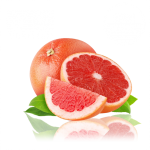 Grapefruits are rich with flavonoids, Vitamin A, B5, B6, and of course C. So, consuming a good amount of Grapefruits has many health benefits.
Grapefruits are rich with flavonoids, Vitamin A, B5, B6, and of course C. So, consuming a good amount of Grapefruits has many health benefits.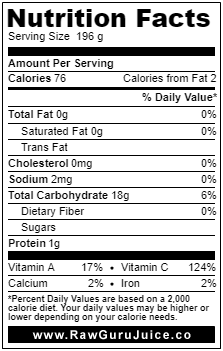 One half a Grapefruit supplies 80% of an adults daily required intake of Vitamin C. Vitamin C helps boost and support the immune system. Pink and Red Grapefruit contain lycopene, a carotenoid phytonutrient. Lycopene had anti-tumor activity. Among the common dietary carotenoids, lycopene has the highest capacity to help fight oxygen free radicals, which are compounds that can damage cells.
One half a Grapefruit supplies 80% of an adults daily required intake of Vitamin C. Vitamin C helps boost and support the immune system. Pink and Red Grapefruit contain lycopene, a carotenoid phytonutrient. Lycopene had anti-tumor activity. Among the common dietary carotenoids, lycopene has the highest capacity to help fight oxygen free radicals, which are compounds that can damage cells.
High in antioxidants and soluble fiber, Grapefruits have been proved to lower cholesterol, prevent kidney stones, and may even help repair DNA. I don’t know about you, but this ruby red fruit seems like a good person to have on your team in time of need.
Ginger: View products with Ginger
Ginger is a good source of vitamin C and B6, magnesium, manganese, potassium and copper.
Ginger is high in gingerol, a substance with powerful anti-inflammatory and antioxidant properties. The health benefits of ginger are largely due to its antioxidants, anti-inflammatory properties and content of therapeutic compounds like gingerol, shogaol, paradol and zingerone.
Used historically as a natural remedy for sea sickness and morning sickness, ginger is perhaps most well-known for its ability to treat nausea and vomiting.
Ginger helps kill off disease-causing fungi due to its powerful anti-fungal properties.
Ginger has tons of benefits: It regulates blood pressure, relaxes and soothes the intestinal tract (IBS), reduces pain levels and improves mobility of people with osteoarthritis and rheumatoid arthritis. But italso has anti cancer properties, relieves joint and muscle pain,eases inflammation, promotes digestion, improves brain function, fights infections, clears skin, helps with weightloss, it improves circulation because if its warming properties and lowers chlesterol levels. Ginger also helps promote healthy sweating, which is often helpful during colds and flus. It also improves absorption and assimilation of essential nutrients in the body.
Ginger is small but its very mighty.
H
Hemp Seeds: View products with Hemp Seed
Hemp seeds contain over 30% fat. They are exceptionally rich in two essential fatty acids, linoleic acid (omega-6) and alpha-linolenic acid (omega-3). They also contain gamma-linolenic acid, which has been linked with several health benefits. Hemp seeds are a great protein source, as more than 25% of their total calories are from high-quality protein. That is considerably more than similar foods like chia seeds and flaxseeds, which provide about 16–18%. Hemp seeds are also a great source of vitamin E and minerals such as phosphorus, potassium, sodium, magnesium, sulfur, calcium, iron and zinc.
They contain high amounts of the amino acid arginine, which is used to produce nitric oxide in the body. Nitric oxide is a gas molecule that makes the blood vessels dilate and relax, leading to lowered blood pressure and a reduced risk of heart disease. The gamma-linolenic acid found in hemp seeds has also been linked with reduced inflammation, which also decrease the risk of diseases like heart disease.
Hemp seeds are a good source of polyunsaturated and essential fatty acids. They have about a 3:1 ratio of omega-6 to omega-3, which is considered in the optimal range. Studies have shown that giving hemp seed oil to people with eczema may improve blood levels of essential fatty acids. It may also relieve dry skin, improve itchiness and reduce the need for skin medication.
About 25% of calories in hemp seeds come from protein, which is relatively high. In fact, by weight, hemp seeds provide amounts of protein similar to beef and lamb. 30 grams of hemp seeds, or 2–3 tablespoons, provide about 11 grams of protein. They are considered a complete protein source, which means that they provide all the essential amino acids. Essential amino acids are not produced in the body and need to be gotten from the diet. Complete protein sources are very rare in the plant kingdom, as plants often lack the amino acid lysine. Quinoa is another example of a complete, plant-based protein source.
Whole hemp seeds are a good source of both soluble (20%) and insoluble (80%) fiber. Soluble fiber forms a gel-like substance in the gut. It is a valuable source of nutrients for the beneficial digestive bacteria, and may also reduce spikes in blood sugar and regulate cholesterol levels. Insoluble fiber adds bulk to fecal matter and may help food and waste pass through the gut. Consuming insoluble fiber has also been linked with a reduced risk of diabetes.
Honeydew: View products with Honeydew
Hydrates the body. Honeydew is made up of 90 percent water, which is why it can quench your thirst and keep the body hydrated on a hot summer day. Plus, it contains a good amount of potassium, which helps maintain the water level in your body by countering your sodium intake.
Promotes skeletal health. Honeydew is rich in calcium, helping your body maintain and improve bone health. It also keeps your teeth healthy and strong.
Keeps the skin healthy. Honeydew is a great source of vitamin C, which plays an important role in the production of collagen in your body. Collagen can repair and nourish not just your skin but also your hair and nails.
Helps reduce weight. Honeydew has a low calorie content, so it’s a perfect fruit snack for people who are trying to lose weight. It’s also rich in fiber that can aid in food digestion.
Prevents hypertension. Honeydew is beneficial for people who are suffering from hypertension, as it has a high potassium content that can help prevent blood elevation.
Reinforces the immune system. The vitamin C in honeydew helps boost your immune system to fight off bacteria and illnesses.
Improves eye health. Honeydew contains lutein and zeaxanthin — these are important phytonutrients that help maintain eye health and reduce eye disorders.
K
Kale: View products with Kale
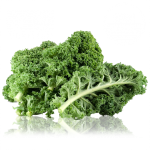
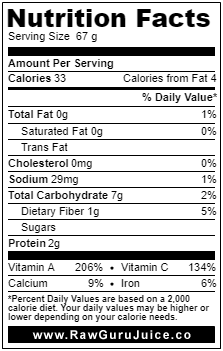 Kale is rich source of vitamin K, beta-carotene, vitamin C, 11 more time lutein than broccoli, and zeaxanthin also an excellent source of calcium Kale is also a good source of iron, folate, thiamin, riboflavin, magnesium, phosphorus, potassium, copper and manganese. Its a multivitamin in green leaves just waiting in your glass bottle of juice. kale juice helps serum lipid profiles and antioxidant systems, and contributes to reducing the risks of coronary artery disease. Kale is filled with fiber and sulfur, both great for detoxifying your body and keeping your liver healthy.
Kale is rich source of vitamin K, beta-carotene, vitamin C, 11 more time lutein than broccoli, and zeaxanthin also an excellent source of calcium Kale is also a good source of iron, folate, thiamin, riboflavin, magnesium, phosphorus, potassium, copper and manganese. Its a multivitamin in green leaves just waiting in your glass bottle of juice. kale juice helps serum lipid profiles and antioxidant systems, and contributes to reducing the risks of coronary artery disease. Kale is filled with fiber and sulfur, both great for detoxifying your body and keeping your liver healthy.
L
Lemon: View products with Lemon
 Lemons are a good source of thiamin, riboflavin, pantothenic acid, iron, and magnesium, and are an excellent source of fiber, vitamin B6, calcium, potassium, and copper, as well as folate and potassium.
Lemons are a good source of thiamin, riboflavin, pantothenic acid, iron, and magnesium, and are an excellent source of fiber, vitamin B6, calcium, potassium, and copper, as well as folate and potassium. 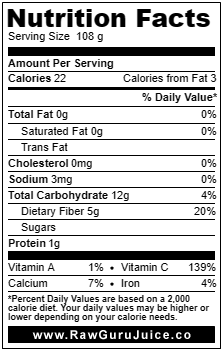 Lemons provide a lot of vitamin C, 187% per serving of the daily value, making it a super infection fighter. Combined with flavonoid glycosides called esperetin and naringenin, they eliminate free-radicals. Free radicals can do serious damage to blood vessels and can contribute to cholesterol build up in artery walls, atherosclerosis, and even heart disease.
Lemons provide a lot of vitamin C, 187% per serving of the daily value, making it a super infection fighter. Combined with flavonoid glycosides called esperetin and naringenin, they eliminate free-radicals. Free radicals can do serious damage to blood vessels and can contribute to cholesterol build up in artery walls, atherosclerosis, and even heart disease.
The citric acid in lemons aids in digestion and helps to dissolve kidney stones, while the ascorbic acid is a natural antioxidant that prevents scurvy. Other antioxidants in lemons include carotenes, beta-cryptoxanthin, zeaxanthin, lutein, and vitamin A, which promotes healthy mucus membranes, skin, and vision.
M
Mango: View products with Mango
 One cup of sliced mangoes supplies 25 percent of the needed daily value of vitamin A.
One cup of sliced mangoes supplies 25 percent of the needed daily value of vitamin A. 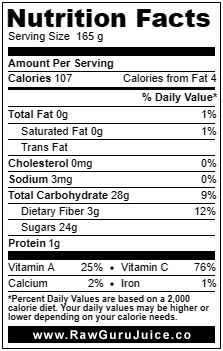 Mango Contains 3 acids that help to maintain the alkali reserve of the body. (tartaric acid, malic acid, trace of citric acid)
Mango Contains 3 acids that help to maintain the alkali reserve of the body. (tartaric acid, malic acid, trace of citric acid)
The high levels of fiber, pectin and vitamin C help to lower serum cholesterol levels. Aids in digestion and elimination. There are antioxidant compounds in mango fruit have been found to protect against colon, breast, leukemia and prostate cancers. These compounds include quercetin, isoquercitrin, astragalin, fisetin, gallic acid and methyl gallat, as well as the abundant enzymes. Mango like papaya contain enzymes for breaking down protein. It also has 25 different kinds of carotenoids that keeps your immune system healthy and strong.
Mint: View products with Mint
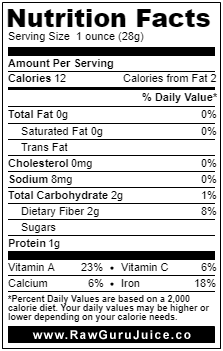 Mint, among being rich in vitamin A, B2 and C, fiber, potassium, iron and a whole mess of other phytonutrients, it is also a wonderful diuretic. So, it is very cleansing. Mint has also been shown to improve the skin, ease chronic asthma and respiratory disorders. Mint it good for the tummy. It is known to have a soothing effect on the belly. It has been proven relieve symptoms of irritable bowel syndrome, including indigestion, dyspepsia, and colonic muscle spasms. Mint has cancer fighting effects from one phytonutrient. The phytonutrient monoterpene has been shown to stop the growth of pancreatic, mammary, and liver tumors. It has also been shown to protect against cancer formation in the colon, skin, and lungs.”
Mint, among being rich in vitamin A, B2 and C, fiber, potassium, iron and a whole mess of other phytonutrients, it is also a wonderful diuretic. So, it is very cleansing. Mint has also been shown to improve the skin, ease chronic asthma and respiratory disorders. Mint it good for the tummy. It is known to have a soothing effect on the belly. It has been proven relieve symptoms of irritable bowel syndrome, including indigestion, dyspepsia, and colonic muscle spasms. Mint has cancer fighting effects from one phytonutrient. The phytonutrient monoterpene has been shown to stop the growth of pancreatic, mammary, and liver tumors. It has also been shown to protect against cancer formation in the colon, skin, and lungs.”
O
Orange: View products with Orange
 we all love orange juice, but nothing like a fresh raw Orange Juice. Its no secrete Oranges are rich in vitamin C, but what you might not know is that on glass of orange a day will help balance high blood pressure, shocked?
we all love orange juice, but nothing like a fresh raw Orange Juice. Its no secrete Oranges are rich in vitamin C, but what you might not know is that on glass of orange a day will help balance high blood pressure, shocked? 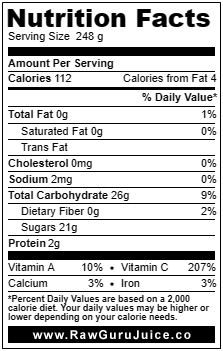 Don’t be, Oranges have a high level of magnesium and potassium. They have an inflammatory properties that help relieve joint pain and contain enough nutrients and mineral to boost your immune system. Yes Oranges even Contain Calcium, so excellent for your bones and teeth, placing calcium where it is needed, instead of robbing it from your bones like diary does. Oranges contain folate increasing growth of skin and blood cells, they are also rich in antioxidants and the cartanoids that fight free radicals to reduce damage to cells. Oranges Niacin Content enable a good DNA in your body. So next time you hear yourself say Oranges contain too much sugar, or my doctor told me not to drink Orange juice, think think think.
Don’t be, Oranges have a high level of magnesium and potassium. They have an inflammatory properties that help relieve joint pain and contain enough nutrients and mineral to boost your immune system. Yes Oranges even Contain Calcium, so excellent for your bones and teeth, placing calcium where it is needed, instead of robbing it from your bones like diary does. Oranges contain folate increasing growth of skin and blood cells, they are also rich in antioxidants and the cartanoids that fight free radicals to reduce damage to cells. Oranges Niacin Content enable a good DNA in your body. So next time you hear yourself say Oranges contain too much sugar, or my doctor told me not to drink Orange juice, think think think.
P
Parsley: View products with Parsley
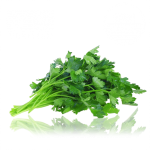 Known for its high vitamin K content – 574% of the daily recommended value. Promoting bone strength, prevention of Alzheimer. Three times more vitamin C than Oranges and 47% of the recommended daily value of vitamin A, carotenes, lutein and zeaxanthin, to counter eye diseases like cataracts and macular degeneration.
Known for its high vitamin K content – 574% of the daily recommended value. Promoting bone strength, prevention of Alzheimer. Three times more vitamin C than Oranges and 47% of the recommended daily value of vitamin A, carotenes, lutein and zeaxanthin, to counter eye diseases like cataracts and macular degeneration.
The iron in parsley (twice as much as in spinach) is essential for the production of an important oxygen-carrying component in the red blood cells called heme. And copper which is important for normal metabolic processes. The manganese in parsley contains super-antioxidant superoxide dismutase, and the folate helps form red blood cells.
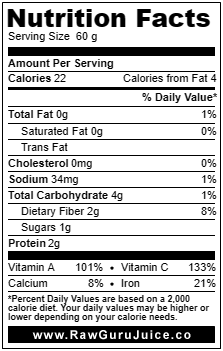 Parsley is great for digestion with its high fiber content. This helps move foods through the digestive tract and controls blood-cholesterol levels. It is a good diuretic. A tea made from parsley is a traditional remedy for colic, indigestion, and intestinal gas. Consumption helps purify the blood and fight cancer as well as the way to detoxify the system of harmful compounds like mercury.
Parsley is great for digestion with its high fiber content. This helps move foods through the digestive tract and controls blood-cholesterol levels. It is a good diuretic. A tea made from parsley is a traditional remedy for colic, indigestion, and intestinal gas. Consumption helps purify the blood and fight cancer as well as the way to detoxify the system of harmful compounds like mercury.
Compound and volatile oils in parsley reduce blood sugar levels. Polyphenolic flavonoids and antioxidants include apiin, apigenin, crisoeriol, and alphathujen. Volatile oils include myristicin, limonene, apiol, and alpha-thujene. It also contains one of the highest antioxidant counts among plants, with an oxygen radical absorbance capacity (ORAC) of 74,349 per 100 grams of fresh, raw parsley.
Parsnips: View products with Parsnip
 Parsnips resembles the carrot a lot, although they are very light in color. It is rich in vitamin C, many B complex groups, vitamin E and K, fiber, potassium and high in Folate. Vitamin K is important because it helps clot your blood and aids in cell growth. Adequate vitamin K intake may also reduce your risk of osteoporosis. Parsnips contain more than 22% of the daily suggested intake of folate, which helps manufacture DNA, RNA and red blood cells. It has been shown to prevent and treat anemia, particularly during pregnancy. As well as decrease the risk of birth defects in newborn infants. Vitamin C helps produce collagen, which forms parts of our bones, tendons, ligaments and blood vessels. Our bodies will also use Vitamin C to produce carnitine, which is involved in the fat metabolism.
Parsnips resembles the carrot a lot, although they are very light in color. It is rich in vitamin C, many B complex groups, vitamin E and K, fiber, potassium and high in Folate. Vitamin K is important because it helps clot your blood and aids in cell growth. Adequate vitamin K intake may also reduce your risk of osteoporosis. Parsnips contain more than 22% of the daily suggested intake of folate, which helps manufacture DNA, RNA and red blood cells. It has been shown to prevent and treat anemia, particularly during pregnancy. As well as decrease the risk of birth defects in newborn infants. Vitamin C helps produce collagen, which forms parts of our bones, tendons, ligaments and blood vessels. Our bodies will also use Vitamin C to produce carnitine, which is involved in the fat metabolism.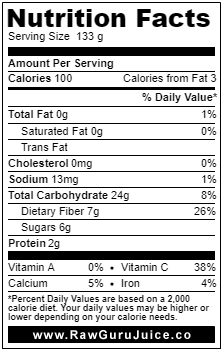
Parsnips are also a great source of the mineral silicon, which promotes healthy bones. Parsnips are shown to help fight cancer by “nourishing the immune system, decrease inflammation in the body, and stimulate beneficial enzymes. They improve conditions of constipation and help to normalize high blood pressure. The parsnip root is a good diuretic and assists in removing obstructions of the viscera. It has been used to treat stomach ailments, jaundice and kidney stones. Parsnips contains both sugar and starch which makes it very tasty. They are also being named the working wonders for hair, skin and nails. This root helps prevent heart disease, cancer, hemorrhoids, stroke, diverticulitis, depression, age related vision and hearing loss, stroke and high blood pressure.
Pea Sprouts: View products with Pea Sprouts
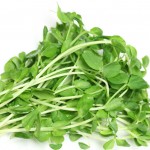 Pea Shoots are a nutritious leaf with high levels of vitamin C and vitamin A.
Pea Shoots are a nutritious leaf with high levels of vitamin C and vitamin A. 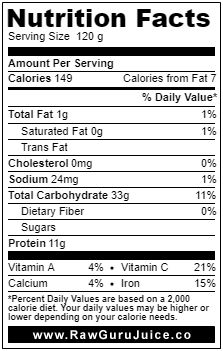 A 50g bag of these tasty greens offers more than half of the RDA for vitamin C, a quarter of the RDA for vitamin A and significant amounts of folic acid. It has seven more times vitamin C than blueberries. Eight times more folic acid than bean sprouts. Four times more vitamin A than tomatoes. Its high in Vitamins A, B, C and E Calcium, Chlorophyll, Iron, Magnesium, Niacin, Phosphorus, Potassium and Amino Acids. It has 20-25% protein. Pea shoots are a great source of three chemo protective agents: folate, antioxidants and carotene. Folate helps produce and maintain cells and protects against DNA damage. Pea shoots are dense with the antioxidants and phytonutrients needed to support the body’s complex inflammation system.
A 50g bag of these tasty greens offers more than half of the RDA for vitamin C, a quarter of the RDA for vitamin A and significant amounts of folic acid. It has seven more times vitamin C than blueberries. Eight times more folic acid than bean sprouts. Four times more vitamin A than tomatoes. Its high in Vitamins A, B, C and E Calcium, Chlorophyll, Iron, Magnesium, Niacin, Phosphorus, Potassium and Amino Acids. It has 20-25% protein. Pea shoots are a great source of three chemo protective agents: folate, antioxidants and carotene. Folate helps produce and maintain cells and protects against DNA damage. Pea shoots are dense with the antioxidants and phytonutrients needed to support the body’s complex inflammation system.
Pear: View products with Pear
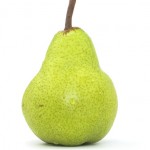 One medium sized pear contains about 20-25% of the daily recommended intake of fiber. A good percentage of the fiber in pears is insoluble. Pears contain vitamin C, a powerful antioxidant which is an important part of your body’s cancer fighting arsenal.
One medium sized pear contains about 20-25% of the daily recommended intake of fiber. A good percentage of the fiber in pears is insoluble. Pears contain vitamin C, a powerful antioxidant which is an important part of your body’s cancer fighting arsenal. 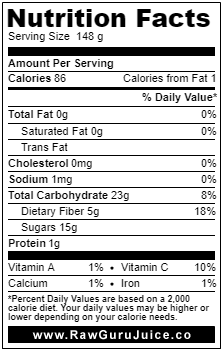 The fiber content in pears is very effective at promoting colon health which will reduce your chances of developing colon cancer.
The fiber content in pears is very effective at promoting colon health which will reduce your chances of developing colon cancer.
Pears contain 10-20 mcg of the natural form of folic acid, folate, and they should be included in a healthy prenatal diet. They help to maintain a healthy pH level and are a good source of boron, which is found to help the body to retain calcium.
Pears help to boost the immune system because they contain antioxidants such as vitamin C and copper which fight off free radicals and disease in the body. When you eat a pear, your body absorbs glucose, which is converted into energy, translates into A great pick-me-up if you feel sluggish in the afternoon.
Pineapple: View products with Pineapple
 Pineapple has lots of vitamins and minerals with vitamin C as the highest at 131 percent of the daily value. A natural antioxidant, vitamin C suppresses coughs, colds, and flu symptoms.
Pineapple has lots of vitamins and minerals with vitamin C as the highest at 131 percent of the daily value. A natural antioxidant, vitamin C suppresses coughs, colds, and flu symptoms. 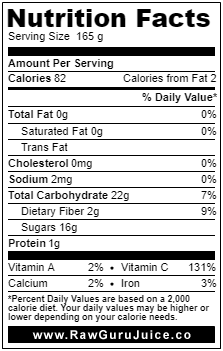 And is essential for synthesizing collagen, the structural protein for healthy blood vessels, organs, skin, and tissue support, heavy metal absorption, and bone strength. Pineapples provides manganese needed for one day in less than 2 servings. A high source of folates, thiamin, biotin, pyridoxine, riboflavin, and minerals like copper and potassium for healthy cell and body fluid maintenance, heart rate regulation, and blood pressure. Vitamin A and beta-carotenes provide additional antioxidants for immune system support and eyesight protection. It’s bromelain enzyme breaks protein down for absorption to provide phytonutrients such as amino acids and peptides needed for digestion, discouraging arthritis inflammation, indigestion, clotting, bruising, and harmful bacteria – even cancer and parasites.
And is essential for synthesizing collagen, the structural protein for healthy blood vessels, organs, skin, and tissue support, heavy metal absorption, and bone strength. Pineapples provides manganese needed for one day in less than 2 servings. A high source of folates, thiamin, biotin, pyridoxine, riboflavin, and minerals like copper and potassium for healthy cell and body fluid maintenance, heart rate regulation, and blood pressure. Vitamin A and beta-carotenes provide additional antioxidants for immune system support and eyesight protection. It’s bromelain enzyme breaks protein down for absorption to provide phytonutrients such as amino acids and peptides needed for digestion, discouraging arthritis inflammation, indigestion, clotting, bruising, and harmful bacteria – even cancer and parasites.
R
Romaine Lettuce: View products with Romaine Lettuce
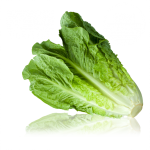 Romaine Lettuce is good for heart health! with a wide array of vitamins and minerals.
Romaine Lettuce is good for heart health! with a wide array of vitamins and minerals.
Vitamins: A (beta-carotnene) B1, B5, B6, B7, B9, C and K; Minerals: chromium, calcium, copper, magnesium, manganese, iron, potassium and phosphorus. Beyond that, it is high in dietary fiber, Omega-3 fatty acids and Molybdenum. It’s a wellrounded food, not super in one area or another. There are times when they say too much of a good thing is bad for you. That’s not the case with romaine lettuce.
It helps prevent cholesterol oxidation, preventing clots and promoting blood flow, preventing heart attacks or stroke. The fibers bind with bile in your intestines and expel toxins while break down cholesterol. 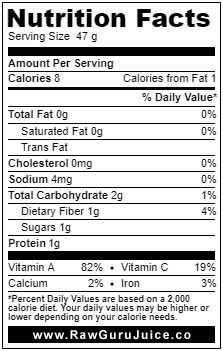 The folic acid promotes healthy blood vessels by inactivating harmful chemicals like homocysteine effectively lowering your risk of a stroke. Plus folate is essential for enzyme metabolism, DNA synthesis and healthy neural tube development for pregnancy.
The folic acid promotes healthy blood vessels by inactivating harmful chemicals like homocysteine effectively lowering your risk of a stroke. Plus folate is essential for enzyme metabolism, DNA synthesis and healthy neural tube development for pregnancy.
The minerals lower blood pressure. The vitamins are antioxidants, good for healthy mucosa, skin, vision, bone and brain health and defending against free radicals that cause Alzheimers. Zeaxanthin, another carotenoid, filters UV rays and prevents damage to the retina through the macula lutea of your eyes. Romaine Lettuce protects against age-related macular disease (ARMD), and minimize your risk of osteoporosis, iron-deficiency anemia and cardiovascular diseases.
S
Spinach: View products with Spinach
 Spinach is high in vitamin A and C, and is one of only four vegetables that are also high in vitamin E. It’s also a good source of choline, calcium, iron, potassium and folic acid. Spinach is high in protein per calorie and has 14 times the iron per calorie than red meat.
Spinach is high in vitamin A and C, and is one of only four vegetables that are also high in vitamin E. It’s also a good source of choline, calcium, iron, potassium and folic acid. Spinach is high in protein per calorie and has 14 times the iron per calorie than red meat.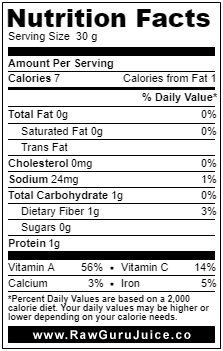
Spinach is one of the highest sources of eye-protecting, cancer-fighting lutein. Lutein has been shown to play a crucial role in protecting against age-related macular degeneration.
Spinach has two powerful antioxidants, glutathione and alpha lipoic acid, are also found in spinach. It is called “nature’s master antioxidant,” and is the primary antioxidant in the cells. It protects DNA from oxidation, detoxifies pollutants and carcinogens, boosts the immune system, aids healthy cell replication, and reduces chronic inflammation. The body is able to produce glutathione, but often we don’t make enough, and as we age, we produce even less.
Spirulina: View products with Spirulina
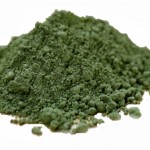 Imagine a plant that can nourish your body by providing most of the protein you need to live, help prevent the annoying sniffling and sneezing of allergies,
Imagine a plant that can nourish your body by providing most of the protein you need to live, help prevent the annoying sniffling and sneezing of allergies, 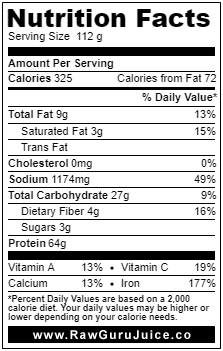 reinforce your immune system, help you control high blood pressure and cholesterol and help protect you from cancer. Does such a “super food” exist? Yes. It’s called spirulina”.
reinforce your immune system, help you control high blood pressure and cholesterol and help protect you from cancer. Does such a “super food” exist? Yes. It’s called spirulina”.
Spirulina is a form of blue-green algae that springs from warm, fresh water bodies. It has the highest protein and beta-carotene levels of all green superfoods, and is also a rich source of GLA (Gamma Linolenic Acid), a popular fatty acid with numerous health benefits. In addition, it is the highest known vegetable source of B-12 and provides optimum levels of vitamins, minerals, trace elements, cell salts, amino acids and enzymes. Amino acids make up 62% of spirulina, so it is a rich source of Protein.
Strawberry: View Products with Strawberry

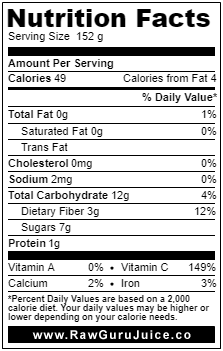 One cup of strawberries contains over 13% of the RDA of dietary fiber, yet only 43 calories. And contains an incredible 136% of the RDA of vitamin C, an effective antioxidant that can help lower blood pressure, ensure a healthy immune system. Also contains 21% of manganese, an essential nutrient that acts as a powerful antioxidant and anti-inflammatory agent. Strawberries are anti-inflammatory, anti-cancer with loads of Antioxidants, Glutathione being one of them. Lets not forget that The potassium, vitamin K, and magnesium in strawberries are important for bone health
One cup of strawberries contains over 13% of the RDA of dietary fiber, yet only 43 calories. And contains an incredible 136% of the RDA of vitamin C, an effective antioxidant that can help lower blood pressure, ensure a healthy immune system. Also contains 21% of manganese, an essential nutrient that acts as a powerful antioxidant and anti-inflammatory agent. Strawberries are anti-inflammatory, anti-cancer with loads of Antioxidants, Glutathione being one of them. Lets not forget that The potassium, vitamin K, and magnesium in strawberries are important for bone health
Sugarcane: View Products with Sugarcane

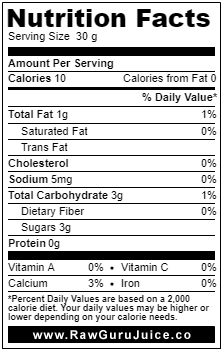 A delicious antioxidant high in flavanoids and a low glycemic sweetner. Containing fructose and glucose which are slowly absorbed by the body requiring no insulin to break down. Unlike the refined sugar derived from it high in sucrose. Flavonoids provide antiviral, anti-allergic, anti-platelet, anti-inflammatory, anti-tumor and antioxidant benefits to the human body. Furthermore, sugarcane juice creates an alkaline environment within. Don’t let the sugar in sugarcane and the amazing flavour fool you. It is good for your body.
A delicious antioxidant high in flavanoids and a low glycemic sweetner. Containing fructose and glucose which are slowly absorbed by the body requiring no insulin to break down. Unlike the refined sugar derived from it high in sucrose. Flavonoids provide antiviral, anti-allergic, anti-platelet, anti-inflammatory, anti-tumor and antioxidant benefits to the human body. Furthermore, sugarcane juice creates an alkaline environment within. Don’t let the sugar in sugarcane and the amazing flavour fool you. It is good for your body.
Sunflower Sprouts: View products with Sunflower Sprouts
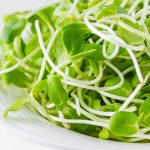 Sunflower sprouts are packed with more protein than spinach. Sunflower sprouts provide vitamin D, helps build strong bones and muscles and controls blood pressure. These sprouts are also a source of lecithin, a phospholipid compound that helps in the body’s transport of fats. This sprout has high content of linoleic acid, its an essential fatty acid great for brain function, skin and hair growth and healthy bones. Sunflower sprouts are also a great source of protein, high in Vitamin A, B, D, and E. Also Minerals such as calcium, copper, iron, magnesium, potassium, phosphorus and zinc. High in Chlorophyll, a blood purifier. It is great for the skin and hair, and also helps to detox the body by attaching to the heavy metals, such mercury and lead, and eventually releasing them.
Sunflower sprouts are packed with more protein than spinach. Sunflower sprouts provide vitamin D, helps build strong bones and muscles and controls blood pressure. These sprouts are also a source of lecithin, a phospholipid compound that helps in the body’s transport of fats. This sprout has high content of linoleic acid, its an essential fatty acid great for brain function, skin and hair growth and healthy bones. Sunflower sprouts are also a great source of protein, high in Vitamin A, B, D, and E. Also Minerals such as calcium, copper, iron, magnesium, potassium, phosphorus and zinc. High in Chlorophyll, a blood purifier. It is great for the skin and hair, and also helps to detox the body by attaching to the heavy metals, such mercury and lead, and eventually releasing them.
Swiss Chard: View Products with Swiss Chard
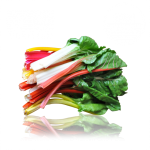
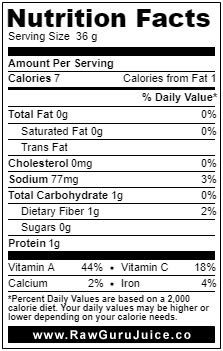 Swiss chard is very high in Vitamin E, K, B6, riboflavin, calcium, magnesium, phosphorus, potassium, copper, manganese and fiber when eaten. It’s a good source of zinc, folate and thiamin has a key phytochemical anthocyans, that makes it effective in preventing cancers of the digestive tract. Its known to be a rich source of vitamin K, which is vital for maintaining bone density. Its great for diabetics in that it protects damage to the Kidneys. Chard contains 13 different polyphenol antioxidants which help you fight disease and biotin Vitamin that You need for hair growth and strength. Its also an excellent source of iron which is needed for red blood cell formation and anemia prevention.
Swiss chard is very high in Vitamin E, K, B6, riboflavin, calcium, magnesium, phosphorus, potassium, copper, manganese and fiber when eaten. It’s a good source of zinc, folate and thiamin has a key phytochemical anthocyans, that makes it effective in preventing cancers of the digestive tract. Its known to be a rich source of vitamin K, which is vital for maintaining bone density. Its great for diabetics in that it protects damage to the Kidneys. Chard contains 13 different polyphenol antioxidants which help you fight disease and biotin Vitamin that You need for hair growth and strength. Its also an excellent source of iron which is needed for red blood cell formation and anemia prevention.
T
Turmeric: View products with Turmeric
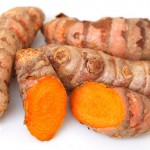 Turmeric is a member of the ginger family. Turmeric actually looks a lot like ginger, but more orange in color.
Turmeric is a member of the ginger family. Turmeric actually looks a lot like ginger, but more orange in color.
For thousands of years, turmeric has been used to treat a variety of ills, but more recently studies has shown that consuming turmeric can help fight infections, reduce inflammations, helps digestive problems, and fight some cancers. It is a good source of iron and manganese and a phytonutrient pigment called called curcumin. According to World Healthiest foods:
“Curcumin is thought to be the primary pharmacological agent in turmeric. In numerous studies, curcumin’s anti-inflammatory effects have been shown to be comparable to the potent drugs hydrocortisone and phenylbutazone as well as over-the-counter anti-inflammatory agents such as Motrin.”(Source)
And the benefit to using turmeric instead of all those drugs is – it doesn’t have all the toxic chemicals drugs have, which means you’ll have less junk in your body.
W
Watercress: View products with Watercress
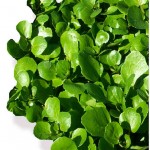 watercress contains more vitamin C than oranges, is higher in calcium then milk, has more iron than spinach, and contains the same protein per calorie as chicken breasts. Its a good source of vitamin A, E, K, B6, thiamin, riboflavin, magnesium, phosphorus, potassium and manganese; and a good source of folate, pantothenic acid and copper.
watercress contains more vitamin C than oranges, is higher in calcium then milk, has more iron than spinach, and contains the same protein per calorie as chicken breasts. Its a good source of vitamin A, E, K, B6, thiamin, riboflavin, magnesium, phosphorus, potassium and manganese; and a good source of folate, pantothenic acid and copper. 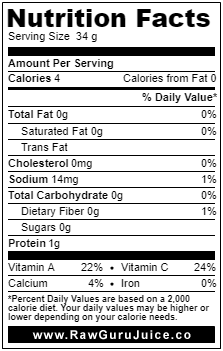 A daily serving of watercress reduces DNA damage to blood cells and enhances the ability of the cells to fight further damage to DNA caused by free radicals. It’s good for your eyes, bones, blood, liver, and even your skin, hair and nails. Juicing watercress adds lots of nutrient rich greens to some our juices and injects an additional bonus of clean-burning protein.
A daily serving of watercress reduces DNA damage to blood cells and enhances the ability of the cells to fight further damage to DNA caused by free radicals. It’s good for your eyes, bones, blood, liver, and even your skin, hair and nails. Juicing watercress adds lots of nutrient rich greens to some our juices and injects an additional bonus of clean-burning protein.
Watercress is renowned for it’s cancer fighting properties. The leafy green plant has high levels of phytochemicals known as isothiocyanates, the same disease fighting components found in brussel sprouts, broccoli, cabbage, bok choy, kai choi, kale, horseradish, radish and turnip. isothiocyanates, or ITC’s, has been shown to “inhibit the development of tumors” and various types of cancer cells.
Watermelon: View products with Watermelon
 Watermelon is 92% water and allows less fat to accumulate in the cells. One of the natural chemicals in watermelons is citrulline, which converts in the kidneys to arginine, an amino acid that works hard for heart health and maintaining a good immune system, helping to keep obesity and type 2 diabetes from becoming issues. Arginine also removes ammonia and other toxicities from your body. Watermelon contains vitamin C – 21% of the daily recommended value – that helps your immune system produce antibodies to fight disease. There’s also a 17% daily value of vitamin A, boosting eye health and preventing such diseases as macular degeneration and cataracts.
Watermelon is 92% water and allows less fat to accumulate in the cells. One of the natural chemicals in watermelons is citrulline, which converts in the kidneys to arginine, an amino acid that works hard for heart health and maintaining a good immune system, helping to keep obesity and type 2 diabetes from becoming issues. Arginine also removes ammonia and other toxicities from your body. Watermelon contains vitamin C – 21% of the daily recommended value – that helps your immune system produce antibodies to fight disease. There’s also a 17% daily value of vitamin A, boosting eye health and preventing such diseases as macular degeneration and cataracts. 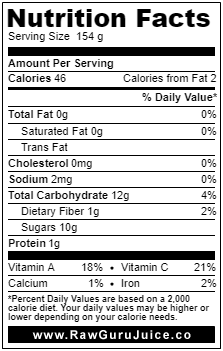 The vitamin B6 content helps form red blood cells and assures your nerves will function as they should. Your body uses vitamin B6 to help break down proteins, so the more protein is consumed, the more vitamin B6 is needed.
The vitamin B6 content helps form red blood cells and assures your nerves will function as they should. Your body uses vitamin B6 to help break down proteins, so the more protein is consumed, the more vitamin B6 is needed.
Rich in the antioxidant lycopene, the remaining 8%, giving watermelon its red colour, protects and nourishes the heart, prostate, and skin. Lycopene reduces inflammation and promotes strong healthy bones, and neutralizes harmful free radicals. The white rind has higher potency of lycopene and higher nutrient concentration than the red center. The anti-inflammatory phytonutrient in watermelon cucurbitacin E, or tripterpenoid, is great for hangovers. It blocks the activity of cyclooxygenase. An enzyme that causes pain, fever and inflammation. Cucurbitacin E also rids the body of nitrogen-containing molecules.
Wheatgrass: View products with Wheatgrass

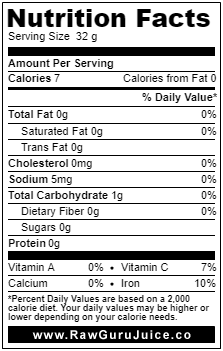 Wheatgrass juice is high In chlorophyll and has an abundance of phytochemical, antioxidant a and vitamin k. Other vitamin and nutrients include vitamin C, vitamin E, vitamin B12, beta carotene, phosphorus, magnesium, potassium, calcium, iron, folic acid, 90 different minerals and 20 amino acids (a complete protein).
Wheatgrass juice is high In chlorophyll and has an abundance of phytochemical, antioxidant a and vitamin k. Other vitamin and nutrients include vitamin C, vitamin E, vitamin B12, beta carotene, phosphorus, magnesium, potassium, calcium, iron, folic acid, 90 different minerals and 20 amino acids (a complete protein).
Z
Zucchini: View products with Zucchini
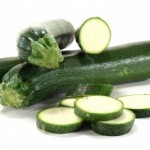 Zucchini is an excellent source of potassium and magnesium which are beneficial to those people diuretics for high blood pressure, because the side effect of that medication is that it leaches these minerals from the body.
Zucchini is an excellent source of potassium and magnesium which are beneficial to those people diuretics for high blood pressure, because the side effect of that medication is that it leaches these minerals from the body.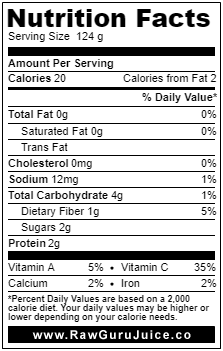
Zucchini Juice helps strengthens bones and prevents brittleness because the related calcium content is so high that it is retained by the body longer than calcium from diary or food supplements. The amounts of Calcium, magnesium and phosphorus in Zucchini are equally balanced, combined with the high potassium count, this combination helps bones mend faster. Amazing healer after surgeries.
It’s antioxidant properties are great. It contains the carotenoids lutein and zeaxanthin which help protect our eyes. It contains nutrients that help stabilize blood sugar, are anti-inflammatory, and fight cancer.
